class: center, middle, inverse, title-slide .title[ # Autos ] .subtitle[ ## Set 11 ] .author[ ### Andrew Dickinson ] .date[ ### Fall 2022 ] --- class: inverse, middle # Content .hi-white[(i) Homeownership] .hi-white[(ii) Rental markets] --- # Housekeeping .pull-left[ .hi[PS03] _(due Friday, Nov. 25)_ - Posted now (a couple of minutes ago) ] .pull-right[ .hi[PS04] _(due Wed, Nov. 30)_ - will be posted by Mon next week ] -- .hi[TotC book report] _(due Thu, Dec. 8)_ - Short (1000 words) assignment - rubric posted on canvas and on the course repo - will be checking for plagiarism -- .hi-red[Final] _(14:45 Wed, Dec. 7)_ - [final schedule](https://registrar.uoregon.edu/calendars/examinations) - Comprehensive exam with an emphasis on the newer material --- class: inverse, middle # Autos --- # Auto use in the US 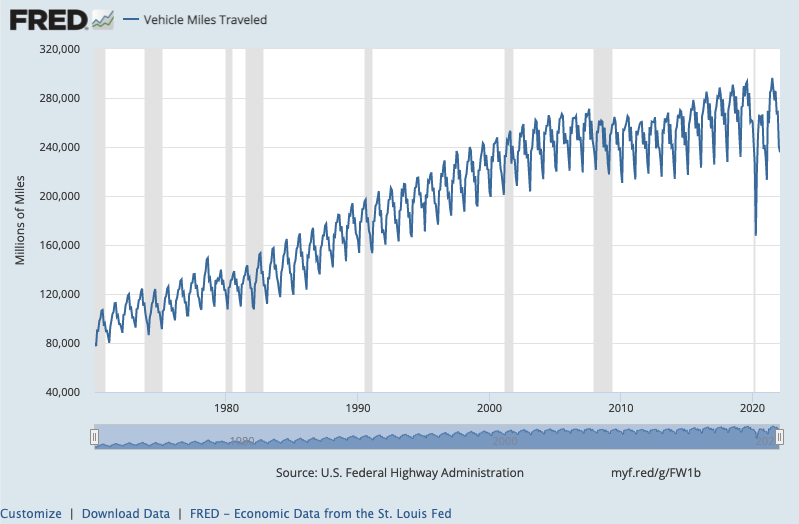 --- # Auto use in the US .pull-left[ 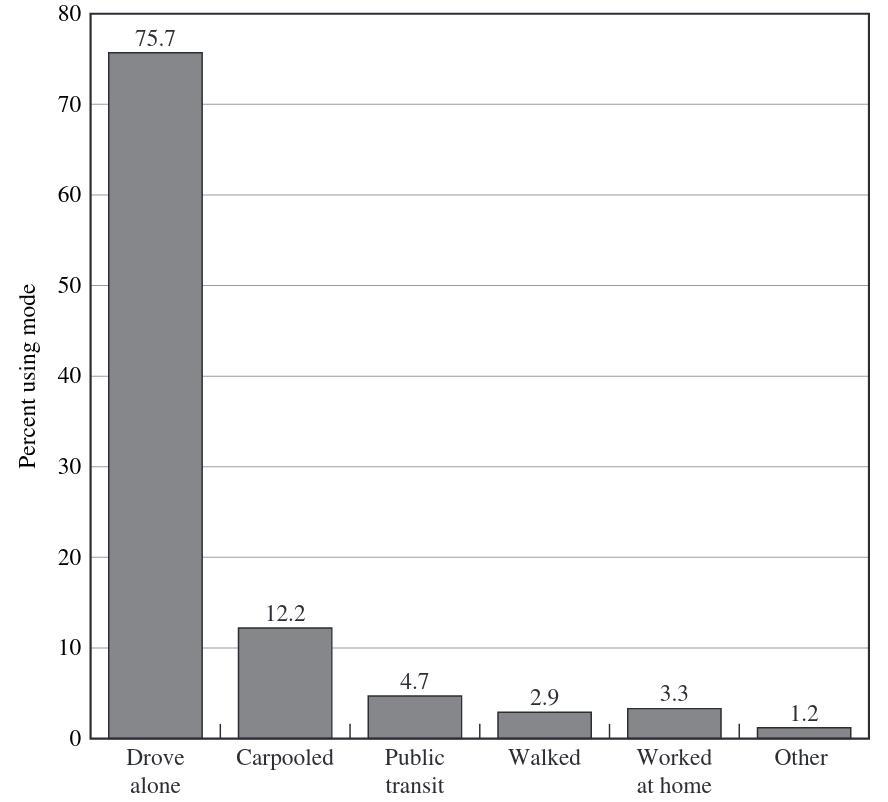 ] -- .pull-right[ .hi[Facts about American commuters:] - 88 % use the car - 5% use public transit - 2 metro areas have public transit use > 10% - NYC - Chicago ] --- class: clear <iframe src="https://ourworldindata.org/grapher/road-vehicles-per-1000-inhabitants-vs-gdp-per-capita" loading="lazy" style="width: 100%; height: 600px; border: 0px none;"></iframe> --- # Climate crisis A recent [UN scientific report](https://www.ipcc.ch/report/ar6/wg1/#SPM) leaves no doubt that humans are responsible for the current climate crisis -- Increased frequency of extreme weather including: .pull-left[ - Wildfires - Winter storms - Hurricanes] .pull-right[ - Heat waves - Floods - Droughts ] -- Other consequences include: .pull-left[ - Mass extinctions - Changes in ocean currents] .pull-right[ - Loss of habitat (reefs, rainforest, ice sheets) - Sea level rise ] --- class: clear 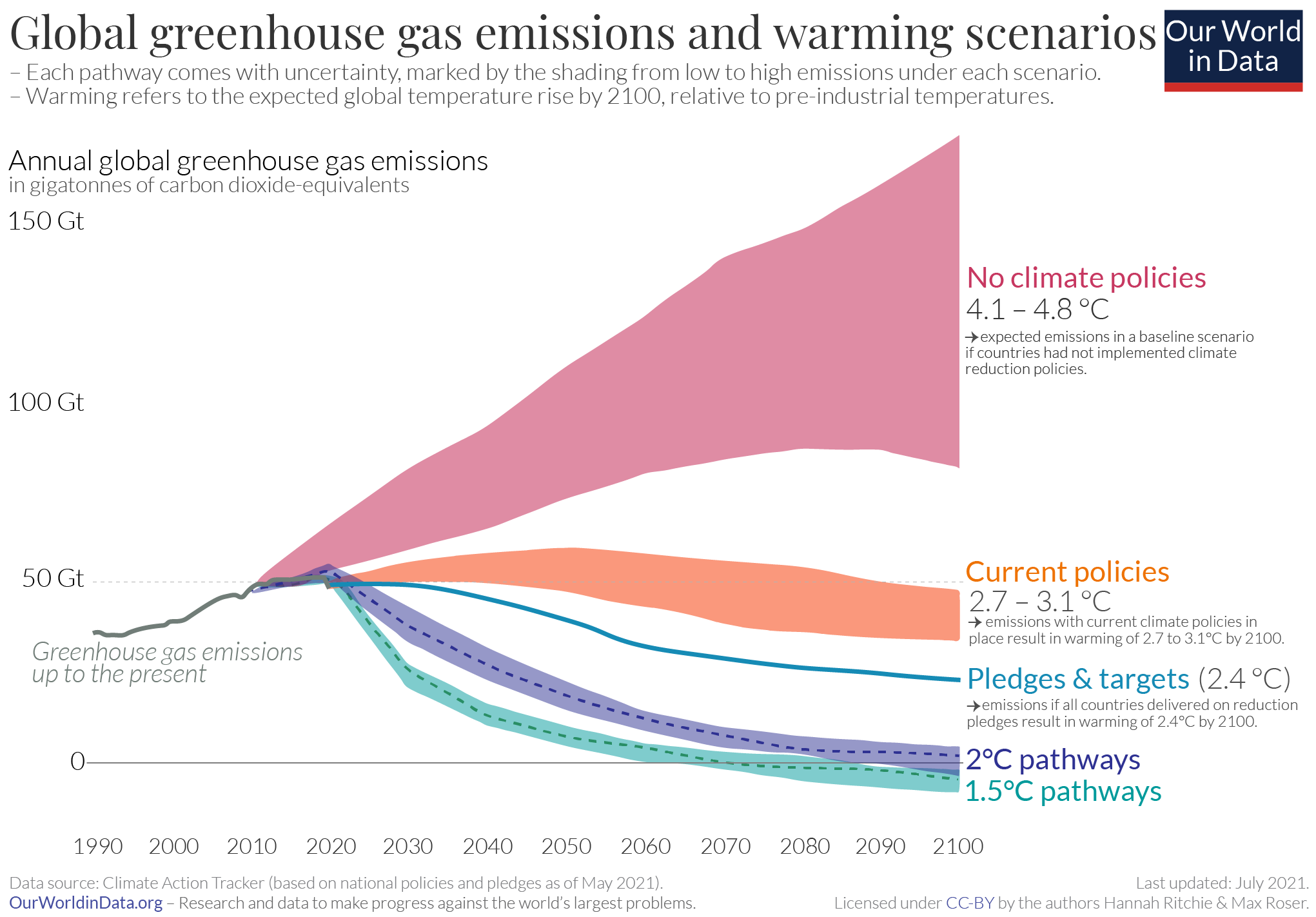 --- class: clear <iframe src="https://ourworldindata.org/grapher/co-emissions-per-capita?tab=chart" loading="lazy" style="width: 100%; height: 600px; border: 0px none;"></iframe> --- class: clear <iframe src="https://ourworldindata.org/grapher/annual-co2-emissions-per-country" loading="lazy" style="width: 100%; height: 600px; border: 0px none;"></iframe> --- # Policy questions CO2 emissions in developing countries are .hi[skyrocketing] -- <br> _How do we .hi[reduce] CO2 per capita emissions?_ -- _What axiom is relevant here?_ -- _Do drivers fully .hii[internalize] the costs of CO2 emissions?_ --- class: inverse, middle # Externalities --- # Externalities .hi[Recall Axiom 3:] .hii[Externalities cause inefficiency] -- What are some externalities from driving? -- .pull-left[ - Congestion - Environmental Damage - Collisions] .pull-right[ - Blight (parking lots instead of parks) - Noise Pollution] -- .hi[How costly is congestion?] Typical commuter spends .hi[47 hours per year] in traffic - Very high in some metro areas (LA: 93, SF: 72, Atlanta: 67) - Estimated gasoline cost due to congestion delays: .hi[5 billion per year] - Time + Gas cost estimate: .hi[63 billion per year] --- # Externalities -- .smallerer[ .hi[Definition: Marginal Social Cost] (MSC) > Added cost to _society_ from one extra unit of production/consumption .hi[Note:] `\(MSC \neq MC\)` ] -- .smallerer[.hi[Definition: Marginal Private Cost] (MPC) > Added cost to _agent_ from one extra unit of production/consumption .hi[MSC] is the marginal cost (private) _plus_ the marginal _external_ cost] -- .smallerer[ .hi[Definition: Marginal Social Benefit] (MSB) > Added benefit to _society_ from one extra unit of production ] -- .smallerer[ .hi[Definition: Marginal Private Benefit] (MPB) > Added benefit to _society_ from one extra unit of production ] --- # Congestion Externalities MEC from congestion = `\(m\cdot v\cdot c\)` where - `\(m\)` is the additional time in traffic from an extra vehicle on the road - `\(v\)` is the number of other road users - `\(c\)` is the opportunity cost of time -- .hi[Note:] When there are few cares on the road, `\(m\)` and `\(v\)` are relatively small - As the number of cars increases, MEC increases (it is nonlinear) - Also: the above formula makes a strong assumption, what is it? --- class: inverse, middle # Congestion pricing --- # Congestion _How do we fix .hi[Congestion]?_ -- _What is the popular answer?_ -- .hi[Build more roads] -- If you build more - more space for cars allowing congestion will decrease -- _What assumption must we make when stating:_ .center[_"building roads will reduce congestion"_] -- .hi[A:] The number of drivers will remain the same after the road is built --- class: clear 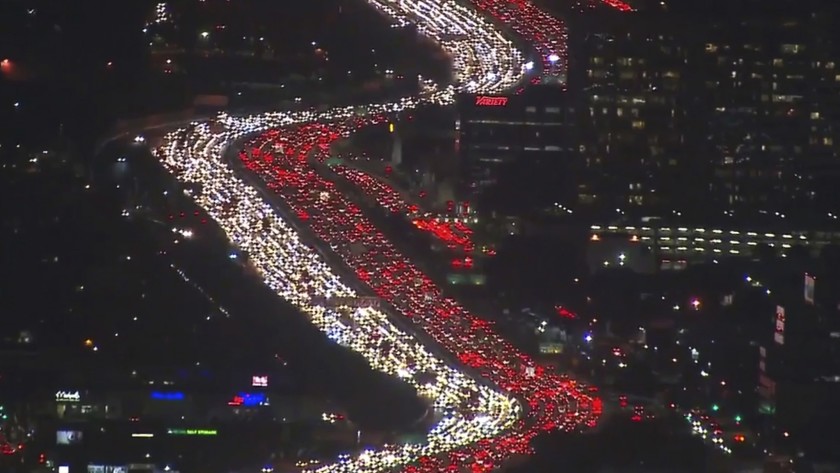 --- # Congestion Think of the .hi[incentives] of drivers -- .hi[(i)] People avoid driving because it is costly - time, gas, maintenance costs -- .hi[(ii)] Building a new road makes it less costly - time costs reduce -- .hi[(iii)] On the .hi[margin], people will start to drive when the new road is built -- .hi[Fundamental law of highway congestion:] > When you expand highways, more drivers will substitute toward the new lane --- # Externalities Generally when facing .hi-red[negative externalities], there exist .hi[two avenues] to reduce private consumption .hii[(i)] Quotas > Set minimum or maximum level of activity allowed -- .hi[Examples:] .pull-left[ - Fishing/hunting quotas/permits - Cap and trade policies ] .pull-right[ - minimum rest for truck drivers - minimum age for driver's license + alcohol consumption ] --- count: false # Externalities Generally when facing .hi-red[negative externalities], there exist .hi[two avenues] to reduce private consumption .hii[(ii)] Taxes > Increase the cost of consumption Sometimes referred to as .hi[sin taxes] -- .hi[Examples:] .pull-left[ - tobacco taxes - alcohol taxes ] .pull-right[ - luxury taxes ] --- # Congestion If building more roads is not a great solution... -- and self-driving cars are not viable... -- .hi[Pigouvian taxes] are an excellent alternative -- .hi[Main insight:] The social cost of driving exceeds private cost So how can we raise the MPC such that `\(MPC = MSC\)` -- _How can we do this?_ -- .hi[Tax them.] -- - Pigouvian tax specific to reducing road congestion is .hi[congestion pricing] --- # Externalities: Pigouvian taxes Many cities across the globe have enacted or are planning to enact congestion pricing .pull-left[ - London - Singapore - Milan] .pull-right[ - Stockholm - Bejing - NYC, LA, SF (coming soon) ] -- .hi[Results:] Following enactment of congestion pricing in London: - Traffic was reduced by 15% - Reduced travel times in the city by 30% --- class: clear .center[  ] London, UK --- # Congestion pricing: London .center[ 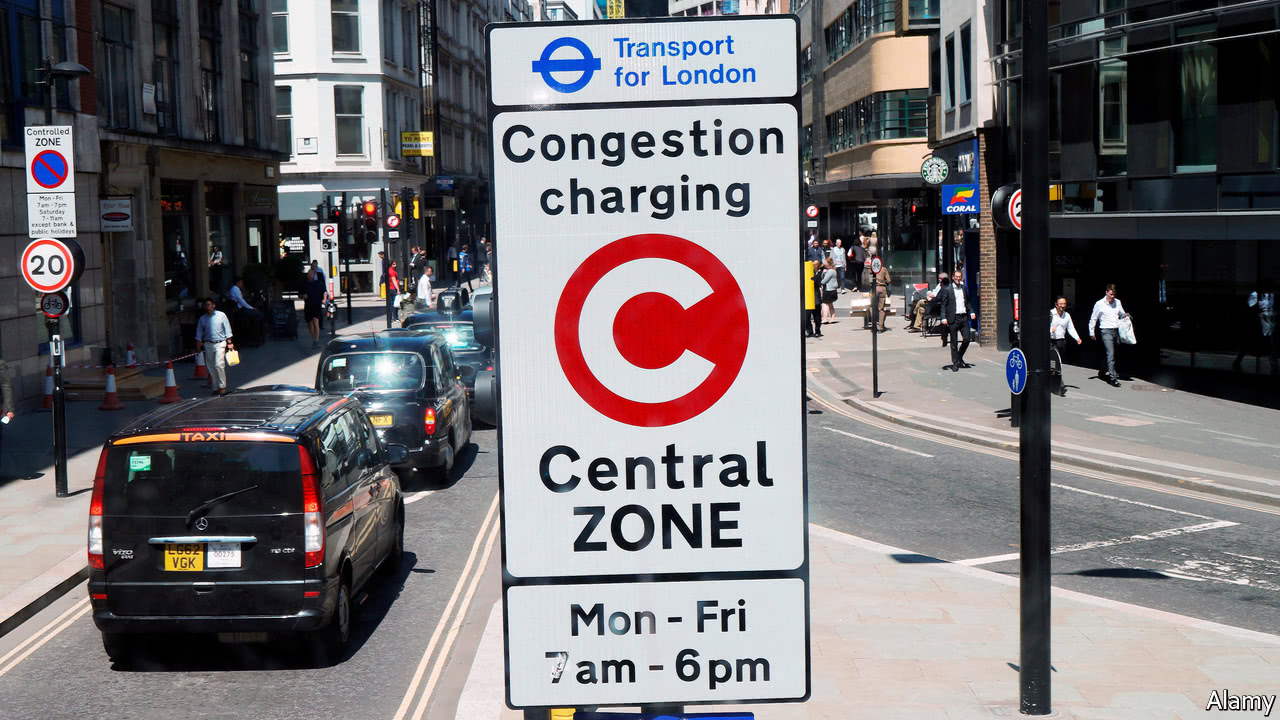 ] --- # Congestion pricing: London .center[ 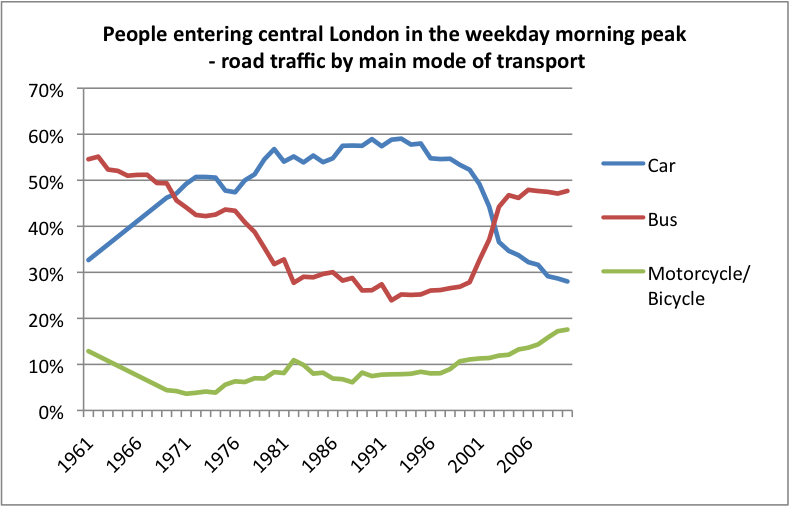 ] --- # Peak vs. Off Period Taxes --- # Mechanisms Model demonstrated congestion taxes reduce traffic volume. How? -- .hi[(i)] Modal substition: switch to carpool, public transit -- .hi[(ii)] Switch to off-peak travel -- .hi[(ii)] Switch route -- .hi[(iv)] Location decisions: change residence or workplace --- # Discussion Congestion taxes sound like a good idea, right? What are the problems? -- - Roads aren't always congested. So tax needs to be time-varying. Gets very complicated - Are all autos charged the same amount (semis and prius?) --